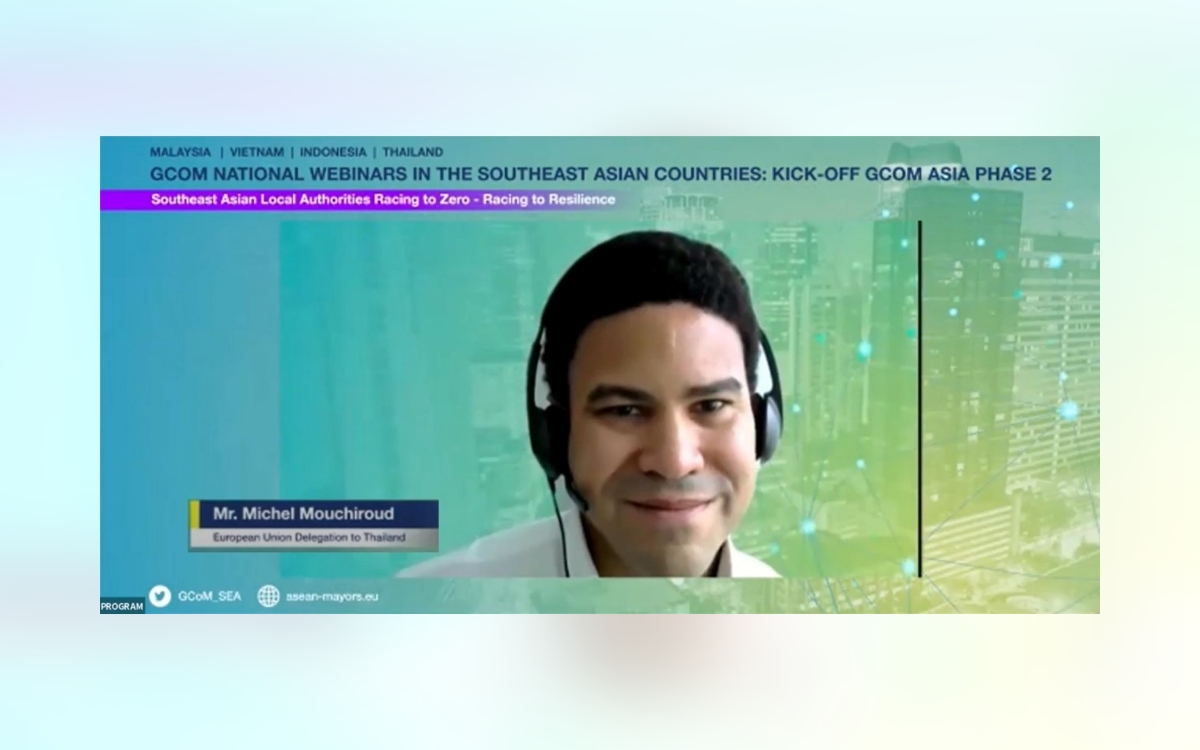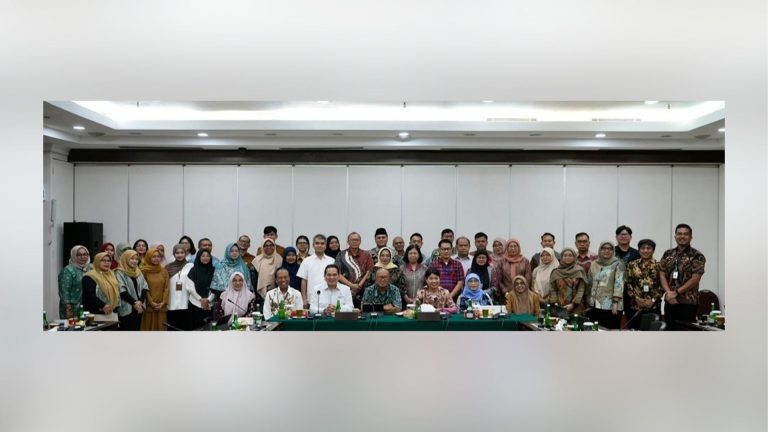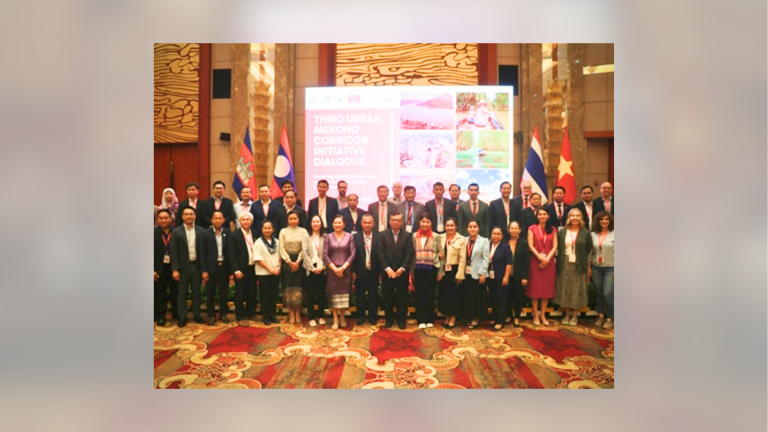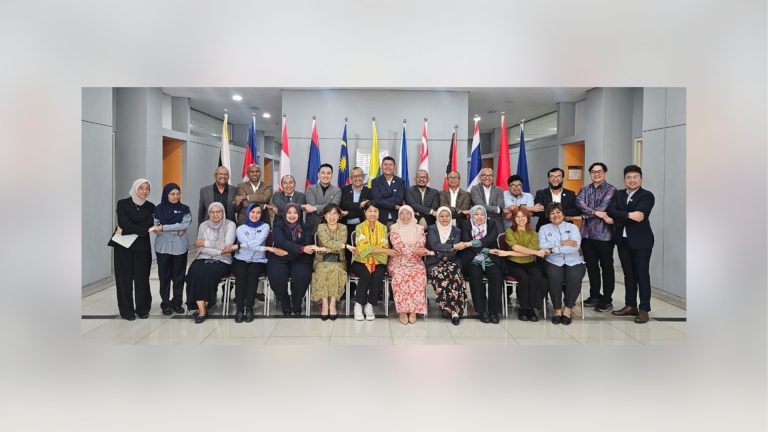17 January 2022 | UCLG ASPAC, the host of the Global Covenant of Mayors for Climate and Energy Southeast Asia (GCoM SEA) Secretariat, conducted a series of webinars as part of the kick-off the GCoM Asia Project funded by the European Union (EU) in four Southeast Asian countries, namely Malaysia, Viet Nam, Indonesia, and Thailand. This event concluded with the signing ceremony of GCoM SEA pilot cities at the end of ASEAN City Leaders Dialogue officially marking the beginning of programme. It was attended by around 200 participants with speakers from the EU Delegations of respective countries, Mayors of the GCoM Phase I pilot cities, technical partners, and local authority associations.
Session 1 – Malaysia
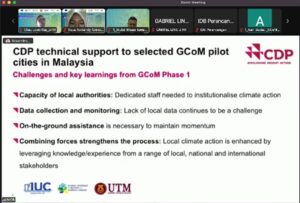 GCoM National Webinar in Malaysia was held to discuss how Malaysian cities, through collaborative actions, could build climate resilience and pave their ways to net-zero carbon emission.
GCoM National Webinar in Malaysia was held to discuss how Malaysian cities, through collaborative actions, could build climate resilience and pave their ways to net-zero carbon emission.
Hang Tuah Jaya Municipal Council, represented by Mr. Rozaidi bin Mahat, presented practice on Sustainable Public Transportation. Mr. Muhammad Ikhsan Wahap, representing Tawau Municipal Council, shared the implementation of a Pedestrian and Cyclist-Friendly principle in the city. Presentation on the Renewable Energy Park initiative came from Mr. Muhammad Ali Tukiman who represented Muar Municipal Council.
Wrapping up the session was Prof. Dr. Ho Chin Siong of Universiti Teknologi Malaysia (UTM) mentioning that mitigation and adaptation of climate change will continue to be the most pressing issue. Thus, urgent actions are needed to limit the rate of current climate change. On top of that, cooperation amongst actors remains key in combating this issue.
This session was graced with the attendance of Mr. Fransesco Floris (EU Delegation to Malaysia) and Dr. Bernardia Irawati Tjandradewi (Secretary-General of UCLG ASPAC/GCoM SEA Secretariat).
Session 2 – Viet Nam
 Webinar for cities in Viet Nam brought up theme “Mainstreaming Climate Action Plan into Local Development Agenda”. The event saw the participation of Mr. Ngo Trung Hai (General Secretary of the Association of Cities of Viet Nam or ACVN), Dr. Bernadia Irawati Tjandradewi, Ms. Nguyen Thi Phuong Thao (Local Project Coordinator in Viet Nam), Ministry of Natural Resources and Environment (MONRE), Institute for Strategies Policies of Natural Resources and Environment (ISPONRE), pilot cities of GCoM Phase I, and CDP.
Webinar for cities in Viet Nam brought up theme “Mainstreaming Climate Action Plan into Local Development Agenda”. The event saw the participation of Mr. Ngo Trung Hai (General Secretary of the Association of Cities of Viet Nam or ACVN), Dr. Bernadia Irawati Tjandradewi, Ms. Nguyen Thi Phuong Thao (Local Project Coordinator in Viet Nam), Ministry of Natural Resources and Environment (MONRE), Institute for Strategies Policies of Natural Resources and Environment (ISPONRE), pilot cities of GCoM Phase I, and CDP.
Mr. Aha Quang Anh, PhD. (MONRE) mentioned that many laws and policies on climate change do not consider a uniform approach and are not implemented properly. Mr. Nguyen Sy Link, PhD. (ISPONRE) said that mainstreaming both mitigation and adaptation efforts is essential and requires three principles: proactive, prevention, and coordination. The participation from MONRE and ISPONRE in this webinar shows that the GCoM Asia Project receives support from the national-level government.
Ms. Cao Thi Minh Thao (Can Tho City) mentioned the participation of experts, data updates, and new methods as the city’s challenges. Ms. Pham Thi Chin (Da Nang City) and Mr. Tran Trung Hau (Tam Ky City) emphasised more on the lack of uniformity in responding to climate change. Mr. John Leung of CDP mentioned that CDP aims to support cities in reducing their GHG emissions by way of innovative business solutions.
Session 3 – Indonesia
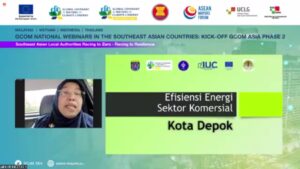 This session was attended by five pilot cities of the GCoM Phase I (Malang, Denpasar, Palembang, Makassar, and Depok). Representing Malang City, Mayor Sutiaji shared the city’s initiatives in mitigating climate change. Denpasar City, represented by Mr. I Putu Wijaya Kusuma (Head of Development Planning Agency), presented the electricity efficiency practice in the city.
This session was attended by five pilot cities of the GCoM Phase I (Malang, Denpasar, Palembang, Makassar, and Depok). Representing Malang City, Mayor Sutiaji shared the city’s initiatives in mitigating climate change. Denpasar City, represented by Mr. I Putu Wijaya Kusuma (Head of Development Planning Agency), presented the electricity efficiency practice in the city.
From Palembang City, Ms. Nyimas Ida Apriani shared that the city is focusing on energy efficiency on public settlement as the second major emission contributor. Palembang is the first city in Indonesia that receive City Climate Gap Fund. Dr. Aryati Puspasari Abady of Makassar City Government shared the experience in addressing the waste issue. Makassar is planning to build a processing centre to convert waste to electricity. “Building Waste-to-Energy is expected to bring great benefit in environmental and economic aspects,” she added. Ms. Ety Suryahaty of Depok City shared various measurements that have been taken as part of Depok’s climate action: shifting to energy-efficient electricity, developing waste banks, increasing green spaces, and developing cycling routes. Closing off the session, Ms. Indah emphasised the importance of collaboration and building relations with other stakeholders in reducing GHG emissions.
Also attending this session were Ms. Sri Indah Wibi Nastiti (General Manager of the Association of Indonesian Municipalities (Asosiasi Pemerintah Kota Seluruh Indonesia or APEKSI), Mr. Seth van Doorn (EU Delegation to Indonesia).
Session 4 – Thailand
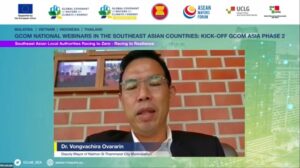 In the webinar for cities in Thailand, Assoc. Prof. Dr. Wichai Kanchanasuwan (Deputy Mayor of Hat Yai City) outlined four planned climate actions: energy, transportation, waste, and green space. Nakhon Si Thammarat City Municipality, represented by Dr. Vongvachira Ovararin, shared that the city aims to maximise Reduce, Reuse, Recycle (3R) principle, plan to collect garbage from all canals, save energy and gas, and reduce waste in the city.
In the webinar for cities in Thailand, Assoc. Prof. Dr. Wichai Kanchanasuwan (Deputy Mayor of Hat Yai City) outlined four planned climate actions: energy, transportation, waste, and green space. Nakhon Si Thammarat City Municipality, represented by Dr. Vongvachira Ovararin, shared that the city aims to maximise Reduce, Reuse, Recycle (3R) principle, plan to collect garbage from all canals, save energy and gas, and reduce waste in the city.
Mr. Anuk Pitukthanin of National Municipality of Thailand (NMLT) mentioned that his organisation has been assisting Thai cities in network development, raising awareness, and engendering and promoting best practices. While Mr. Thawatchai Saengkhamsuk of TGO said that his organisation has currently built the low carbon city programme and provides incentives for participating local governments. He also highlighted the main challenge for cities is data collection, thus relevant capacity building is needed.
Mr. Michel Mouchiroud (EU Delegation to Thailand) thanked everyone involved in the GCoM Asia Project implementation. He specifically thanked NMLT for promoting GCoM initiatives to Thailand cities.








